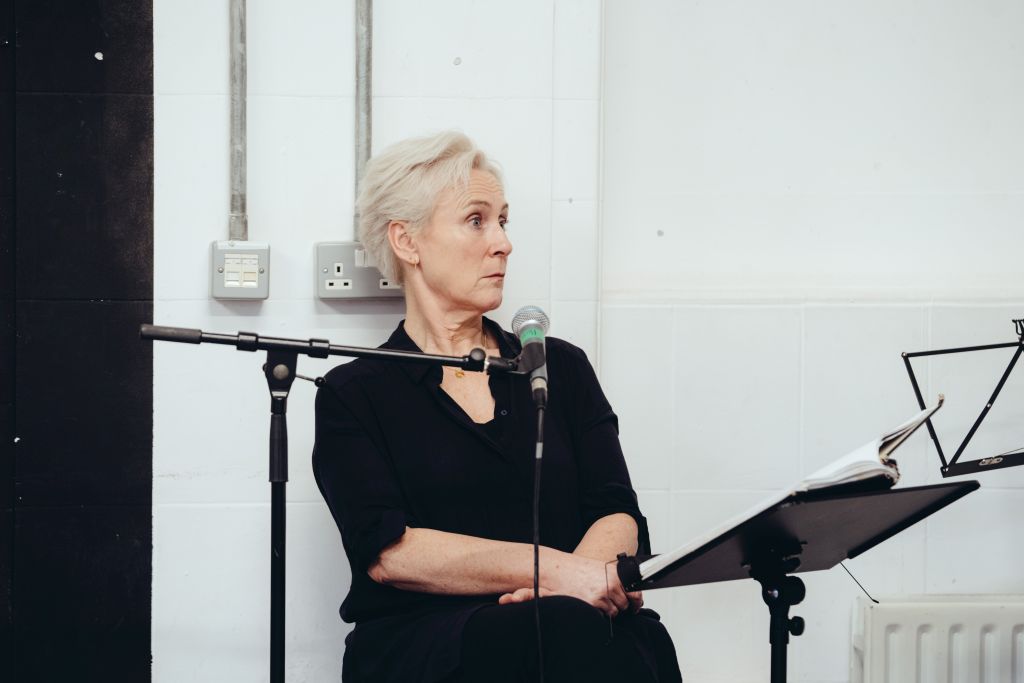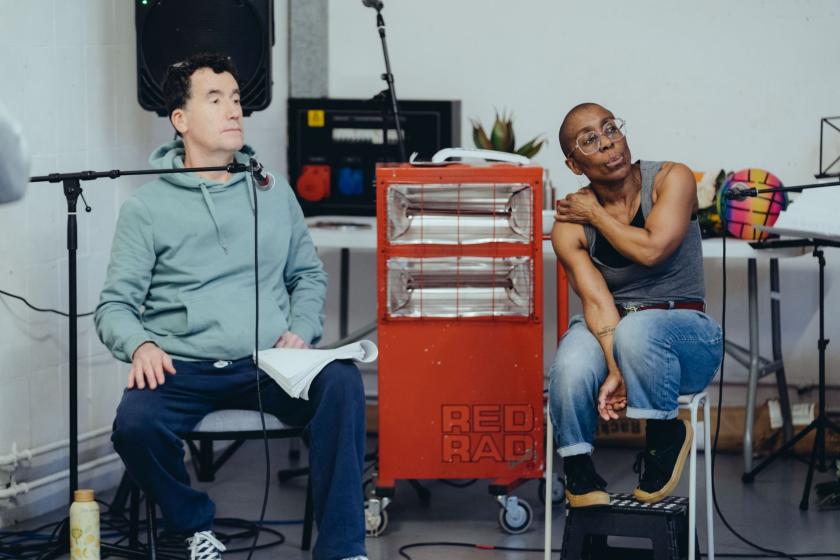It started with a Guardian long-read. I’m ashamed to admit it since so many shows could say the same, but that was the beginning.
It was the summer of 2022, and James [Yeatman] and I had just finished making two shows back-to-back with our company, Kandinsky. It was a pretty brutal return to making work after the doldrums of lockdown, with first The Winston Machine at New Diorama Theatre (NDT), then SHTF at the Schauspielhaus in Vienna, beset by the Omicron wave of Covid. We’d had two rehearsal processes blown apart by illness, were totally exhausted, and felt like maybe we’d never have another idea.
Then NDT opened applications for Intervention 01 – a scheme that saw them ceasing performances for six months to offer no-strings-attached research and development time. It was a response to the challenges facing the sector; time to explore new, messy, unformed, boundary-pushing ideas. It was too good an opportunity not to apply. (Lauren Mooney pictured below)
 James found the article in question, about Elise Bohan’s book on transhumanism, a movement (of which she’s a proponent) working ‘to address – or end – what [she] calls the “tragedies of reality”: ageing, sickness and involuntary death.’ Transhumanists believe evolution has taken us as far as it can: now, the body’s shortcomings can be addressed through technological intervention. It’s a spectrum, with cyber-goths on one side, sewing their Oyster card chips into their palms (harmless, each their own) – but the more research we did, the more we discovered, at the other end, huge amounts of money and power; the richest people in our society working to quite literally end death.
James found the article in question, about Elise Bohan’s book on transhumanism, a movement (of which she’s a proponent) working ‘to address – or end – what [she] calls the “tragedies of reality”: ageing, sickness and involuntary death.’ Transhumanists believe evolution has taken us as far as it can: now, the body’s shortcomings can be addressed through technological intervention. It’s a spectrum, with cyber-goths on one side, sewing their Oyster card chips into their palms (harmless, each their own) – but the more research we did, the more we discovered, at the other end, huge amounts of money and power; the richest people in our society working to quite literally end death.
There seemed to be something here, some germ of a show, and we were delighted to be accepted into Intervention 01 to explore it further. Kandinsky has a collaborative process, alternating reading and research with weeks spent working in rehearsal rooms with performers, designers, musicians. Before our workshop, we spoke to experts and read not just Bohan but Donna Haraway, Émile P. Torres, Mark O’Connell. Every major tech billionaire seemed to be investing in transhumanist research, working to reverse, slow or stop ageing; Amazon-founder Jeff Bezos, with Altos Labs; Paypal-founder Peter Thiel, with SENS Research; Google even has a whole department, Calico, looking for scientific solutions that will allow people to lead “longer and healthier lives”. (Helen Schlesinger in rehearsal, pictured below)
 Who can argue with a longer and healthier life? Grief, loss, watching the people we love suffer – we would probably all prefer not to experience these things. But isn’t a little suffering necessary, sometimes? Doesn’t it give us empathy for the natural world, our fellow creatures living and dying, doesn’t it make us who we are? Transhumanists would say no – that an attachment to these outdated concepts is a symptom of the knots we’ve twisted ourselves into, so as to make peace with a world that is otherwise unbearable. To them, I’m resisting progress, like historic opposition to antibiotics and vaccines.
Who can argue with a longer and healthier life? Grief, loss, watching the people we love suffer – we would probably all prefer not to experience these things. But isn’t a little suffering necessary, sometimes? Doesn’t it give us empathy for the natural world, our fellow creatures living and dying, doesn’t it make us who we are? Transhumanists would say no – that an attachment to these outdated concepts is a symptom of the knots we’ve twisted ourselves into, so as to make peace with a world that is otherwise unbearable. To them, I’m resisting progress, like historic opposition to antibiotics and vaccines.
Technology often seems to promise that the world can be without discomfort, loss, friction, but our current technological reality does not seem to have been entirely to our collective benefit. And now the people who made that world for us are creating a new future, without our really knowing what it involves, without our permission. We were disturbed by the confidence of these people, their unaccountability and seeming certainty that all of us, given the choice, would prefer not to be stuck with our fallible human bodies. This transhumanist desire to actively escape the corporeal was interesting to us. Theatre is a medium of the body – it’s live, physical and about bodies watching other bodies in rooms. This seemed a good reason to explore the subject through theatre, as did the tension between our anxiety and our sympathy – with the fear of grief, pain, the desire to live. Tension’s an interesting starting point for a show: not what do we think, and know, but what do we not know yet? What can we discover together?
In workshop, we began to pursue the narrative device of "brain uploading": the idea that one day it will be possible to separate a person’s "self" from their physical body by removing and in some way "scanning" the brain, after death. From that scan, they posit, you can recreate, electronically, a consciousness. Will that ever be possible? Who knows – there’s still so little agreement on what consciousness even is – but this Cartesian insistence on a self separate from the body felt rich with narrative possibilities, and the story flowed from there.
More Life is set 50 years from now, in a future where the tech is just coming into being. The form we discovered in that first workshop, which has guided us through years of research, development and rehearsals, is one of bodies in a room: a story being told about the future, by a company of actors, together. They are speaking from now, from the room they share with us, a room where there are still so many possible futures. Perhaps, if we are lucky, we’ll even get a say in what ours looks like.
- More Life at the Royal Court Jerwood Theatre Upstairs to 8 March
- More theatre on theartsdesk















Add comment